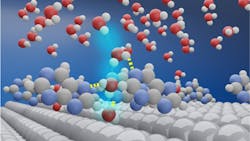Purine Additives Boost Platinum Catalyst Efficiency for Hydrogen Production
Researchers from Chiba University in Japan have developed a method to reduce platinum use in water electrolysis by modifying cathodes with purine-based organic molecules. The approach increases hydrogen evolution reaction (HER) activity by more than four times, potentially lowering the cost of hydrogen production and improving electrolyzer efficiency. The study, led by Syunnosuke Tanaka and Masashi Nakamura from the Graduate School of Engineering, was published in the International Journal of Hydrogen Energy.
The work aligns with U.S. Department of Energy targets to produce hydrogen at $2 per kilogram by 2025 and $1 per kilogram by 2030. Platinum’s high cost and limited availability are key barriers to achieving these goals, according to the researchers. By incorporating purine bases — naturally occurring molecules found in DNA and RNA — the team significantly enhanced the HER performance of platinum catalysts, reducing the need for precious metal loading.
Tests showed that purine and theophylline provided the strongest improvements, increasing HER activity by 4.2 and 5 times, respectively. Structural analysis and modeling revealed that purine molecules create cage-like hydrogen-bonded structures around water molecules, accelerating the removal of hydroxide ions and lowering the energy barrier for hydrogen formation. When applied to commercial platinum/carbon catalysts, purine-modified electrodes reportedly demonstrated 3.2 times higher HER activity in alkaline media.
According to Nakamura, the findings could advance cost-effective hydrogen production systems powered by renewable energy. The team plans to further optimize catalyst stability and explore scalable applications for industrial electrolyzers.
About the Author
Amanda Joshi
Managing Editor
Amanda Joshi has more than 18 years of experience in business-to-business publishing for both print and digital content. Before joining Chemical Processing, she worked with Manufacturing.net and Electrical Contracting Products. She’s a versatile, award-winning editor with experience in writing and editing technical content, executing marketing strategy, developing new products, attending industry events and developing customer relationships.
Amanda graduated from Northern Illinois University in 2001 with a B.A. in English and has been an English teacher. She lives in the Chicago suburbs with her husband and daughter, and their mini Aussiedoodle, Riley. In her rare spare time, she enjoys reading, tackling DIY projects, and horseback riding.

